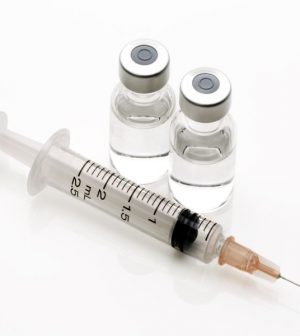- Could Your Grocery Store Meat Be Causing Recurring UTIs?
- Are You Making This Expensive Thermostat Error This Winter?
- Recognizing the Signs of Hypothyroidism
- 10 Strategies to Overcome Insomnia
- Could Artificial Sweeteners Be Aging the Brain Faster?
- Techniques for Soothing Your Nervous System
- Does the Water in Your House Smell Funny? Here’s Why
- Can a Daily Dose of Apple Cider Vinegar Actually Aid Weight Loss?
- 6 Health Beverages That Can Actually Spike Your Blood Sugar
- Treatment Options for Social Anxiety Disorder
Anti-Vaccine Movement a ‘Man-Made’ Health Crisis, Scientists Warn

The anti-vaccination movement is now a global crisis, an international panel of scientists say, and everyone must do more to combat it.
“We are alarmed that the WHO [World Health Organization] this year declared vaccine hesitancy a top-10 international public health problem. This is a man-made, dangerous and wholly unnecessary crisis,” said Dr. Scott Ratzan. He’s founding editor of the Journal of Health Communication. He’s also the founder of the International Working Group (IWG) on Vaccination and Public Health Solutions.
The new Salzburg Statement on Vaccine Acceptance, published July 2, has been endorsed by 60 leaders in public health from the Americas, Europe, Asia, Africa and Australia.
According to the group, vaccines have prevented hundreds of millions of infectious diseases — such as polio, measles, hepatitis B and meningitis — and save up to 3 million lives a year. They are cost-effective, too. Every U.S. dollar spent on childhood immunization returns up to $44 in benefits, according to the IWG.
But in the United States, outbreaks of measles have recently occurred in hotspots where parents have refused to vaccinate their children. In response, some U.S. states have reacted by closing “personal belief” loopholes that allowed parents to not immunize a school-aged child.
“The resurgence of potentially life-threatening diseases like measles, which the U.S. Centers for Disease Control declared eliminated in the United States in 2000, undermines the integrity of childhood protections that thousands of dedicated scientists, doctors and public health officials spent the better part of the last century putting in place,” said Lawrence Gostin. He directs the WHO Collaborating Center on National and Global Health Law, and is also co-director of the IWG.
“Parents do have rights to make informed decisions about vaccinating their children,” Gostin added, “but they do not have the right to place their children, or other children, at risk of a serious infectious disease. We need to do a far better job of reaching out to vaccine-hesitant parents.”
And the problem is now a global one, the consortium of scientists added in a journal news release. So, more must be done to combat false information about childhood vaccines being spread by anti-vaxxers.
The experts called on governments and policymakers to support laws that limit exemptions from mandatory vaccination and to regard childhood vaccination as an essential service — in line with services such as police, firefighters and public sanitation.
Social media companies and major search engines also need to better monitor the vaccine information they provide in order to prevent the spread of inaccurate and false claims about vaccine safety, just as they do for sexually explicit, violent and threatening messages, the group said.
The statement also urged advocacy groups, educators and health professionals to work together to correct misleading vaccine information and to provide reliable, accurate information through mass and social media.
Two physicians on the frontlines of the issue in the United States agreed that more must be done.
The new statement “is timely and well-reasoned,” said Dr. Eric Cioe-Pena, who directs global health at Northwell Health, in New Hyde Park, N.Y. “It is my hope that the larger global community will take action along with the medical and public health leaders in this statement,” he said.
Dr. Edward Chapnick is head of infectious diseases at Maimonides Medical Center in New York City. He called the new statement “immensely important in 2019, as the U.S. faces its worst measles outbreak in this century.”
According to Chapnick, “it may be impossible to completely wipe out misinformation on the internet, [but] we can certainly take steps to ensure that medically sound information from established and respected sources is the default setting in every search engine.”
For their part, the IWG intends “to keep up a steady drumbeat of accurate vaccine communications until the traditional public consensus in support of childhood immunization is restored,” Ratzan said in the news release.
More information
The U.S. Centers for Disease Control and Prevention has more on childhood vaccines.
Source: HealthDay
Copyright © 2026 HealthDay. All rights reserved.










